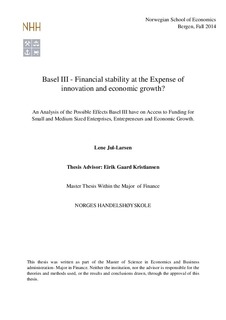Basel III - Financial stability at the Expense of innovation and economic growth? : An Analysis of the Possible Effects Basel III have on Access to Funding for Small and Medium Sized Enterprises, Entrepreneurs and Economic Growth
Master thesis
Permanent lenke
http://hdl.handle.net/11250/276151Utgivelsesdato
2014Metadata
Vis full innførselSamlinger
- Master Thesis [4372]
Sammendrag
This thesis investigates the impact of intro
ducing the Basel III banking regulations. Specifically
how it affects access to funding for innovative SMEs and entrepreneurs. Access to funding for
these ent
erprises is vulnerable, thus an
interesting question is whether Basel III improves or
deteriorates
the situation.
The financial crisis had a major negative impact on the world economies and caused permanent
losses, both
contributing to a d
ownward revision
of prospects for economic growth. SMEs and
entrepreneurs are key participants in impr
oving economic growth, hence the question of how
Basel III affect economic growth through
possible changes in access to funding for SMEs and
entrepreneurs is
also
addressed in this thesis.
Both empirical studies and the discussion
s
in this thesis find
evidence of Basel III affecting
access to funding for SMEs and entrepreneurs in a
negative way. I
t causes reduced lending and
increased credit risk premiums
,
affecting SMEs and entrepreneurs to a
greater
extent than la
r
ger
fi
r
ms
. However, findings suggest
that the country
-
to
-
country differences will diverge. I also
find that SMEs and entrepreneurs’ access to funding is dependent on the economic
environment. Thus, a stable economy, which is the objective of Basel III, in the long term, may
ease the access t
o bank lending. This effect also applies
to
alternative
funding such as venture
capital. Both bank lending and venture capitalists are procyclical in supply of credit, hence less
fluctuation
in the economy result
in
a
reduction in volatility of the suppl
y of credit
to SMEs and
entrepreneurs
.
Based on these findings the impact on economic growth
seems to be divided. The findings
implies a slowdown in economic growth in the short term, while future prospects will increase
because stability in the economy r
educe probability of a costly crisis and ease the access to
funding.
